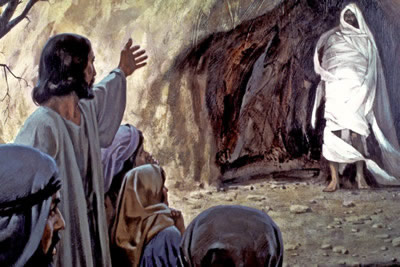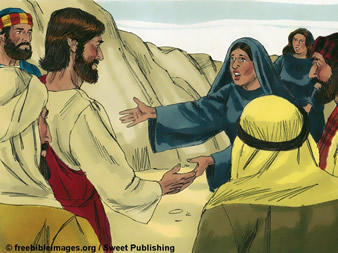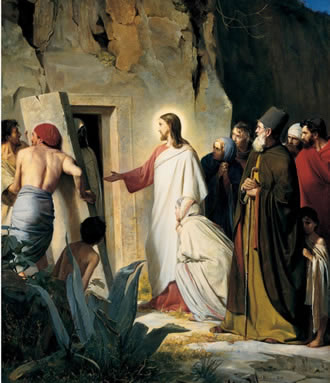Jesus - The Resurrection & The Life

by Dennis Pollock
In this devotional study we shall look at a single event from the life of Jesus, which gives us a major insight into the nature of God. It starts with a man getting sick. The man’s name was Lazarus, and he was in fact a friend of Jesus. It seems a little strange to think of Jesus having friends. Nearly all of us have friends, but sometimes we suppose that Jesus, being Jesus, would have no relationship any closer than any other relationship. But we forget that Jesus, besides being fully God was also fully human. Like all humans He had some relationships that were closer than others. And Lazarus and his two sisters, Martha and Mary, were three of His closest friends.
Lazarus’ sickness was no common cold. We aren’t told exactly what it was, but it was serious, in fact so serious that Mary and Martha sent a messenger some distance to find Jesus and tell Him, “He whom You love is sick.” They knew Jesus well. They had seen Him heal the sick wholesale, and felt sure that He would either come immediately or perhaps speak a word from a distance and instantly heal their brother. Once the messenger arrived where Jesus and His disciples were staying, our Lord’s response was rather strange, given what would soon happen. He declared, “This sickness will not lead to death, but to God’s glory, so that the Son of God may be glorified through it.” The messenger returned to Lazarus’ house, and told the two sisters, but he also had to tell them that Jesus gave no indication that He was coming to see them. In fact Jesus stayed precisely where He was for several days.
The disciples were probably relieved. In that area, so near the hyper-fanatical religious leaders who lived in Jerusalem, there had been death threats and even attempts on Jesus’ life. It made sense that Jesus would want to stay away – no use asking for trouble and bringing Jesus’ ministry to a premature end. But Lazarus did not get better. In fact he got decidedly worse, and in a short time he was dead. Still Jesus had not come.
It was a double shock to the two sisters. They could hardly believe their beloved brother, who had been healthy not long before, had suddenly and mysteriously died. But more shocking still was the knowledge that their great Friend, the One who had healed so many, had made no effort to come and apply His amazing healing touch to His friend. He who healed strangers by the hundreds would not come and heal their brother. Over and over they must have said, “If only He had been here! Lazarus would be alive and well. Why didn’t He come?”
Staying Put
Here we have a powerful insight into the mysterious nature of our great Creator. It turns out that God doesn’t always move according to our expectations and timetables! There will be times in the lives of every man or woman who walks with God and loves Jesus, when God will simply not make sense at all. Sometimes He will do things before we think He should, but more often He will take far more time to act and move on our behalf than we feel is proper. We have prayed; we have fasted; we have quoted all the promises of the Bible that we know, and still heaven is silent. There is no word, there is no evidence that our situation is improving. Often the opposite is true, and our situation has gone from bad to terrible, from doubtful to hopeless. And still God remains mute!
Finally Jesus tells His disciples that He wants to go and see Mary, Martha, and Lazarus. He tells them that Lazarus is dead, and then says something very strange: “I am glad for your sakes that I was not there, that you may believe.” What a curious thing to say about His friend, a friend He could easily have saved from death by His presence: “I am glad I was not there.” Jesus gives the reason for His gladness: “that you may believe.” In His mind even the death of Lazarus is a good thing. It will serve as a faith lesson for all the disciples. Here again is an insight into the nature and perspective of the Almighty. God thinks the creation and building of faith in the hearts of His people is a big deal – so big that He is willing to let His children experience temporary perplexity and extreme dismay if it will ultimately increase our faith.
We would love to suppose it otherwise. We would greatly prefer it if happy, pleasant, carefree seasons would be the great faith-producers. If only we could go months and years or maybe even decades in comfortable prosperity and ease, and see our faith rise and soar – now that would surely be the best way! But somehow God has never seen it that way. He takes no pleasure in seeing us placed in stressful situations and pressures, but still He wisely knows that we will all need at least some of these times, to complete His work of faith in our hearts. The apostle Paul put it this way: “We had the sentence of death in ourselves, that we should not trust in ourselves but in God who raises the dead” (2 Corinthians 1:9). Nowhere in the life of Jesus do we see this more clearly than in this story of Lazarus.
“If Only…”
 When Jesus arrived at the house of His friends, Martha rushed out to see Him. Her first words no doubt revealed the thought that had played over and over in her mind over the last days. There is no greeting, no “It’s great to see you.” She gets straight to the point and blurts out, “Lord, if You had been here, my brother would not have died.” In this short outburst she was making two statements: 1) You’re too late, and 2) “I thought you cared about us!” At this point Martha had never read the gospel of John (since it would not be written for another fifty years or so). She had no idea that Jesus was about to raise her brother from the dead. She could only go by the facts at hand, and the facts she had didn’t present Jesus in a very good light.
When Jesus arrived at the house of His friends, Martha rushed out to see Him. Her first words no doubt revealed the thought that had played over and over in her mind over the last days. There is no greeting, no “It’s great to see you.” She gets straight to the point and blurts out, “Lord, if You had been here, my brother would not have died.” In this short outburst she was making two statements: 1) You’re too late, and 2) “I thought you cared about us!” At this point Martha had never read the gospel of John (since it would not be written for another fifty years or so). She had no idea that Jesus was about to raise her brother from the dead. She could only go by the facts at hand, and the facts she had didn’t present Jesus in a very good light.
Jesus didn’t explain his tardiness in responding to her anxious request. God rarely feels the need to give us all the details or reasons why He moves when He does and delays when He pleases. He spoke directly to the heart of the issue, telling distraught Martha, “Your brother shall rise again.” Martha recalled Jesus’ teachings about a general resurrection of the people of God at the end of the age, and replied, “I know that he will rise again in the resurrection at the last day.” She was correct; she had been around Jesus long enough to have her eschatology straight, but she didn’t quite grasp the whole picture. Jesus told her, “I am the resurrection and the life. He who believes in Me, though he may die, he shall live. And whoever lives and believes in Me shall never die. Do you believe this?”
This was perhaps a little too much for Martha. She believed Jesus, but wasn’t quite sure what His strange statement really meant. But she knew that He was God’s representative, the Messiah of Israel, and she compliantly said, “Yes, Lord, I believe that You are the Christ, the Son of God, who is to come into the world.” Martha, for all her worrying and nervousness, was a believer. We shall assuredly see her in heaven.
The Power of Believing
There are many things one can believe that make little difference in terms of improving one’s life. You may believe that Michael Jordan was the greatest basketball player in sports history, but your life will go on pretty much the same as ever. You may believe that Robert E. Lee was a far better general than U. S. Grant, but it won’t help you to live even one minute longer than otherwise. You may believe that President Kennedy was killed as a result of a conspiracy of communists, but it won’t improve your personal life, your health, or your longevity. However God tells us that when we believe that Jesus Christ is God’s Son, and rest our faith fully upon His Person and work, we shall possess eternal life from that point on. And because that is precisely what God wants for every one of us, He stresses faith – big time!
Jesus asked about Mary, and Martha took off to find her sister. “The Teacher has come, and He is calling for you,” she told her. Mary instantly went to Jesus and fell before Him. Her first words were the exact words Martha had said, “Lord, if you had been here, my brother would not have died.” It was partly a question and probably partly a gentle rebuke, and it no doubt reflected a conversation the two distraught sisters had had with each other again and again over the last several days.
Mary was sobbing and some of her friends were in tears as well. The human pain and misery seemed to overwhelm Jesus, and the Bible tells us, “He groaned in the spirit and was troubled,” Then we read that amazing two-word sentence: “Jesus wept.” How odd that Jesus, who knew full well that He would soon raise Lazarus from the dead, could feel so troubled at the extreme grief of His friends and His friends’ friends. Some foolish men have maintained that real men are so tough, so impervious to pain, (and apparently so insensitive) that they never cry. But they are wrong, decidedly so. Jesus the Man who could face down a legion of demons, the One who could rebuke the hypocritical religious leaders of Israel, calling them snakes and blind, the One who would eventually carry the sins of the whole world on His shoulders and willingly lay down His young, thirty-three year old body so that others might live forever, could also cry very real tears and feel intense and deep emotion over the hurts of humanity. What an amazing combination we find in Jesus of strength and tenderness, of holy fire and melting compassion!
Resurrection
Jesus made his way to the tomb of Lazarus which was a simple cave with a large stone placed over the opening. He had been strangely and inexplicably slow in responding to the request of Mary and Martha, but now He was all action and speed. “Take away the stone,” he thundered, with that voice of authority that had cleansed the patchy skin of lepers, restored withered arms and legs, and driven demons out of madmen. Martha, good old practical Martha, quickly spoke out the obvious: “Lord, by this time there is a stench, for he has been dead four days.”
A second time in this story we find Jesus declaring the priority of faith. First he had told His disciples of His gladness in not being there, so that they might believe. Now He tells Martha, “Did I not say to you that if you would believe you would see the glory of God?” Even here, when He knows the Father has sent Him for the purpose of raising dead Lazarus, He still insists that His miraculous touch be accompanied with at least a little faith on the part of His friends. He also set forth a spiritual principle which was good both then and now, and will be true as long as people are eager to see the moving of God’s mighty hand. People who would see God’s glory must be believers – professional skeptics, inveterate worriers, and perennial doubters will see little or nothing of the things of the Spirit. It is and has always been the way of the kingdom.
Jesus then prayed a prayer, but this was not a request for God to raise Lazarus from the dead. No, in the mind of Jesus, God had already said yes to that, although Lazarus’ body was still lying still in the tomb, emitting a terrible odor. Jesus instead prayed, “Father I thank You that You have heard Me. And I know that You always hear Me, but because of the people who are standing by I said this, that they may believe that You sent Me.” For a third time in this story Jesus refers to faith, and reiterates His desire that men and women might believe on Him. He does not say, “that men and women might be a little nicer,” or do a little better, or start helping the poor, or showing more civic pride. He recognizes that His Father has heard His Prayer “that they may believe You sent Me.” God certainly values and demands good behavior and moral living, but first He demands faith. “Without faith it is impossible to please Him.” And the faith that saves is not some general faith, or faith in a generic, choose-whom-you-like God, or a warm, fuzzy feeling that things are going to turn out OK. No, it is a faith aimed squarely at Jesus Christ, the Son of the living God.
Jesus now turned His attention to Lazarus, or should we say Lazarus’ rotting corpse. It was not His prayer that raised the dead man. After Jesus prayer Lazarus was still as dead and stiff and lifeless as ever. But now Jesus opened His mouth with the voice of command: “Lazarus, come forth!” The Scriptures, always known for their understatement, simply declare: “And he who had died came out bound hand and foot with graveclothes, and his face was wrapped with a cloth.”
 The Bible tells us, “Where the word of a king is, there is power,” (Ecclesiastes 8:4) and Jesus is King over kings, presidents, prime ministers, armies, navies, nations, empires, and even death itself. The cold fingers of death could no more resist Jesus’ words than could the stormy winds on the Sea of Galilee when He told them to shut up and be at rest. Lazarus was now alive, healthy, and out of the tomb. More significantly in Jesus’ eyes, there was a new measure of faith in the hearts of those who loved Him. They were becoming the kind of radical believers who would rise up and shake the world after Jesus’ death and resurrection, and His return to His rightful place at the right hand of His Father.
The Bible tells us, “Where the word of a king is, there is power,” (Ecclesiastes 8:4) and Jesus is King over kings, presidents, prime ministers, armies, navies, nations, empires, and even death itself. The cold fingers of death could no more resist Jesus’ words than could the stormy winds on the Sea of Galilee when He told them to shut up and be at rest. Lazarus was now alive, healthy, and out of the tomb. More significantly in Jesus’ eyes, there was a new measure of faith in the hearts of those who loved Him. They were becoming the kind of radical believers who would rise up and shake the world after Jesus’ death and resurrection, and His return to His rightful place at the right hand of His Father.
From this single, incredible event in the life of our Lord Jesus, we see a couple of major points. First, God may not always come running the minute we call upon Him. He is, after all, God Almighty. He is not our waiter or bellboy. And secondly we see that Jesus really, really, really wants us in the place of faith. He will create situations, delay answers to prayer, allow death sentences, raise long-dead hopes… whatever it takes to build in us the kind of rugged, radical, determined, irresistible, undeniable, unstoppable faith that the Father is looking for in our lives. And with that kind of faith, like Martha of old, we shall believe and we shall see the glory of God!
![]()
To see a full listing of all articles available, go to our Written Devos Page.
For a full listing of all articles as audio mp3
files (free downloads), go to our Audio Devos Page.
For inspirational devos, bios of Christian leaders, free downloads, and the latest SOGM news:
Your donations are needed and greatly appreciated!

















